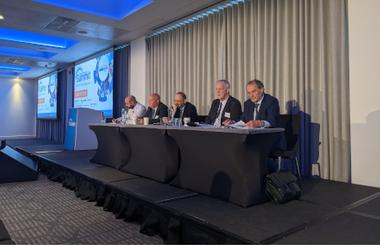A new HM Revenue and Customs (HMRC) policy on non-business activities could negatively impact charities, the tax authority has admitted.
Representatives from HMRC delivered a session at the Charity Finance Summit, Civil Society Media’s annual conference, yesterday.
David Smith, senior policy advisor, VAT principles policy team, at HMRC, told delegates that a two-stage approach to determine whether or not an activity constitutes a business activity for VAT purposes “very much impinges on charities”.
Smith pointed out that the change is not charity-related but could nevertheless have an undesirable impact on the sector.
He said: “That’s the big issue at the moment from our point of view, from a VAT perspective.”
New two-stage approach
In June, HMRC announced a change to its long-standing policy following several court decisions.
Under the new approach, HMRC will no longer apply the “business test” based on six criteria from the cases of Lord Fisher [1981] STC 238 and Morrison’s Academy [1978] when deciding whether an income and associated income is related to a business activity.
Smith explained that the new policy has to do with “anybody who may have some non-business activities as well as business activities”.
“Charities in particular inevitably do have non-business activities. The issue is that because it’s now only a two-stage test, there’s less to think about in some ways but therefore it could be a little bit more difficult sometimes to determine what is business or non-business. It applies to anyone who might have non-business activities.
He emphasised that “this is not HMRC suddenly just changing their policy” but that the change is based on recent court cases.
Clarification on the policy
In a brief published in June, HMRC said it “previously accepted that where a charity supplies nursery and crèche facilities for a consideration that is fixed at a level designed to only cover its costs, this is not a business activity for business purposes.”
Len Dean, VAT partner at Bishop Fleming, told Smith that people could misinterpret this and think that the change is specific to that area.
Smith answered: “What the Revenue and Customs brief does is highlight the particular sort of businesses or organisations that this would have a particular relevance to. It doesn’t necessarily mean therefore it’s only those people.
“But also, with nurseries, for instance, it could be that having to bring in this new test means that they need to be a bit more careful in how they determine whether they have a business or non-business activity. So it’s just highlighting types of businesses that might need particularly to consider the fact that the rules have changed. But it applies to anyone who might have non-business activities.”
Sector might perceive HMRC as ‘not very compassionate’
Also speaking on the panel was Andrew Edwards, deputy director, individuals policy directorate at HMRC.
Talking about the differences between businesses and charities, he said that when it comes to the latter, tax inspectors tend to think about how not to tax them.
He said: “I don’t want to go into stereotypes about tax inspectors, but contrary to what you believe they don’t all exist to extract the most amount of money from people. They exist to get it right. In one way, what’s important is to get it right. You do approach things like charities in a different way.
“I think that the sector sometimes feels we’re not very compassionate. It’s not that we’re not compassionate. When you say no to this that means some child doesn’t get some operation or something like that and that can be quite difficult sometimes to deal with those sorts of issues. Fundamentally, our role and the role that we’re trying to do is to get the right answer and make sure people pay the right amount of tax.”
Feedback is ‘incredibly valuable’
Edwards said that feedback from the sector is incredibly valuable and helpful in terms of making policies.
He added: “Sorry that sometimes when you send us ideas and suggestions, you don’t possibly get back what you wanted or what you expected. For example, if we’re in the run up to the budget, we often aren’t even allowed to answer. Sometimes, there are government lines that we have to give you. But I did want to reassure you that actually, the representations you make are incredibly useful.
“It could be helpful to us to know how tax reliefs are working. We can’t necessarily do something about it but certainly if a minister was to ask us ‘what’s upsetting the charity sector at the moment, how would so and so impact on [charities]’ your insight and thoughts on that are useful. I would encourage you to keep feeding that stuff in through things like the Charity Tax Group, which is quite a useful way of bringing it all together, [or] you can just write to us directly.”
Related articles











